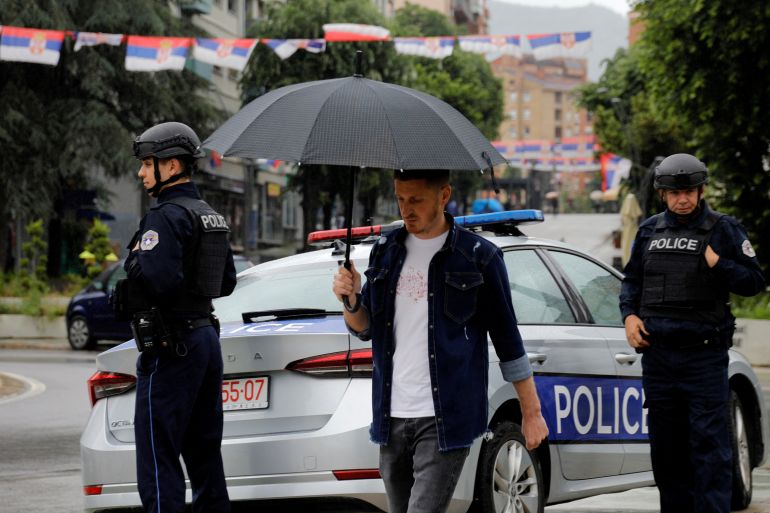No breakthrough at EU talks to ease Serbia, Kosovo tensions
EU’s Josep Borrell had summoned Kosovo’s Kurti and Serbia’s Vucic for urgent talks in Brussels amid soaring tensions.

The leaders of Serbia and Kosovo have made no breakthrough in EU-hosted emergency talks aimed at defusing tensions around their border.
The European Union’s top diplomat said on Thursday they agree on the need for early elections amid fears of a return to open conflict.
Keep reading
list of 3 itemsSerbia’s Vucic calls for withdrawal of mayors in north Kosovo
‘Serbian nationalists’ propaganda’: Kosovo slams Djokovic comment
EU foreign policy chief Josep Borrell had summoned Kosovo’s Prime Minister Albin Kurti and Serbian President Aleksandar Vucic for urgent talks to try to bring an end to a series of violent clashes near their border.
“I think the two leaders understand the severity of the situation,” Borrell said after hours of talks each Kurti and Vucic. The two refused to meet face-to-face in Brussels but held separate talks with Borrell.
Borrell conceded that they have “different interpretations of the causes and also the facts, consequences and solutions.”
The 27-nation bloc has for years been leading talks aimed at reconciling the two foes, but with little success.
Serbia and its former province Kosovo have been at odds for decades. Their 1998-99 conflict left more than 10,000 people dead, mostly Kosovo Albanians. Belgrade has refused to recognise Kosovo’s 2008 declaration of independence.
Tensions flared anew last month after Kosovo police seized local municipality buildings in northern Kosovo, where Serbs represent a majority, to install ethnic Albanian mayors who were elected in a local election that Serbs overwhelmingly boycotted.
The EU had threatened Kosovo with political consequences, such as suspending high-level visits and financial cooperation, if it does not reverse course on the elections.
Borrell said the EU has repeatedly called on the two sides to help restore calm and return to the negotiating table. “So far all we have been witnessing is just the opposite,” he said, reading a written statement to reporters.
On the positive side, Borrell said, “we agreed on the need for new elections and discussed in detail the modalities and the steps on how to get there”.
‘Kurti’s terror’
Vucic appeared downbeat. He was unable to say what steps, if any, might be taken in the days and weeks ahead to calm things down. He said that Serbs in Kosovo no long want to live under “Kurti’s terror,” and that no face-to-face talks are likely anytime soon.
Vucic told reporters that he would not walk away from any talks, but said that in his meeting with Borrell and his team, “I also warned that Serbs are in very tough position and do not want to endure the terror they have been forced to endure so far”.
“There is an open [man] hunt for the Serbs every day,” Vucic added. He said that EU officials “have done all in their power but how things will develop depends much less on Borrell than on those who are not interested in de-escalation”.
Serbia has put its troops on the border on the highest state of alert amid a series of recent clashes between Kosovo Serbs on one side and Kosovo police and NATO-led peacekeepers on the other. In recent weeks, NATO has sent in reinforcements.
The tensions persisted last week with three stun grenades exploding near Kosovo police stations in the north of the country, while Kosovo Serbs staged protests in front of municipality buildings.
Vucic earlier said there can be no negotiations until Serbs who have been arrested by Kosovo police for attacks on Kosovo police and NATO-led peacekeepers are released.
Borrell called on Serbia to release the the three Kosovo police officers “immediately and unconditionally”.
Meanwhile, NATO Secretary-General Jens Stoltenberg vowed that its peacekeepers “will continue to act impartially. We have increased our presence and will continue to take all necessary measures to ensure a safe and secure environment and freedom of movement for all communities in Kosovo.”
Just four months ago, the EU’s Borrell had made things seem promising. He exited talks with Vucic and Kurti to announce that Serbia and Kosovo had given their tacit approval to an EU-sponsored plan to end months of political crises and help improve their ties longer-term.
But the “deal” unravelled almost immediately as both leaders appeared to renege on commitments that Borrell suggested they had made.